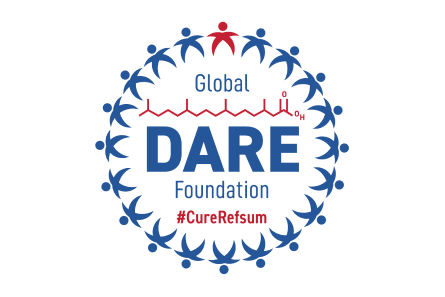Global DARE Foundation
Cycle 3
Adult Refsum disease is a metabolic disorder caused by a number of faulty genes (principally PHYH) which affect the pathway that degrades a plant-derived chemical called phytol which some bacteria found in ruminant animals and fish turn into Phytanic Acid. In humans if phytanic acid is not degraded it accumulates in nerves, liver and fat. Phytanic acid is not produced in the body but found in some foods as a result of the bacterial fermentation of green plants or algae. The highest concentration of phytanic acid is found in dairy products, beef, lamb and some fish products. Refsum disease can be life threatening if undiagnosed.
Last updated 04/30/2025
Clinical
Disease Class
Bone diseases
Genetic diseases
Inherited metabolic disorder
Neurological diseases
Ophthalmic diseases
Skin diseases
Body Systems
Digestive
Metabolic
Muscular / Skeletal
Nervous / Sensory
Organs
Blood
Bones
Ears
Eyes
Heart
Kidneys
Liver
Muscles
Nerves
Nose
Skin
Known Genetic Link
Yes, one or more genes directly cause the condition
causative_genes
PEX7
PHYH
contributory_genes
None specified / unknown
Type of Inheritance
Autosomal recessive
Newborn Screening
No
Disease Mechanism(s)
Enzyme deficiency
Inherited metabolic disorder
Lipid metabolism disorder
Age of Onset
Adolescence (12-17)
Adulthood (age 18-64)
Early childhood (age 1+-5)
Middle childhood (6-11)
Average Age at Diagnosis
Adolescence (12-17)
Adulthood (age 18-64)
Life Expectancy
Elderly (age 65+)
Affected Sex(es)
Female
Male
National Prevalence
101-1000
Global Prevalence
1001-10000
National Incidence
Less than 10
Global Incidence
Less than 10
Symptoms / Phenotypes
abnormal brain features
abnormal skeletal morphology
anosmia
cardiac abnormalities
hearing loss / hearing impairment
ichthyosis
peripheral neuropathy
vision problems
Biomarkers
Diagnostic
· Phytanic acid
Monitoring
· Phytanic acid
Therapeutic
· Phytanic acid
Existing Therapies
Complementary and Alternative treatments
· Low phytanic acid diet
Off-Label Drug Use
Organizational & Research
Cell Lines
None
Cell Lines, share
N/A
Disease Model
Mouse
Disease Model, Involvement
Funded
Disease Model, share
All our disease models are freely available
Clinical Trial Role
Not involved
Biobank, Institution
None
Center of Excellence, Institution
Guy's and St. Thomas' NHS Foundation Trust
Massachusetts Eye and Ear General Hospital
Center of Excellence, Involvement
Consulted
Designed
Endorsed/Certified/Accredited
Registry
Yes, we have a registry that we created
Data Collected, Registry
Clinical data
Genetic data
Longitudinal natural history data
Medication usage
Patient contact info
Data Entered by, Registry
Patients
Platform, Registry
CoRDS
Natural History Study
No, we do not have a natural history study, but we plan to create or collaborate on one
FDA Patient Listening Session
No
FDA Patient-Focused Drug Development (PFDD) Program
No
ICD Codes
We use an ICD-10 code capturing the family of diseases to which our disease belongs
We use an ICD-11 code capturing the family of diseases to which our disease belongs
Diagnostic Guidelines
In the process of creating formal diagnostic guidelines for publication in a peer-reviewed journal
Science Advisory Board Policies
Yes, willing to share SAB policies
Research Network Policies
Has CRN but no policies
Research Roadmap
Yes we have a Research Roadmap, and will share policies
International Chapters
None
International Partners
Europe
